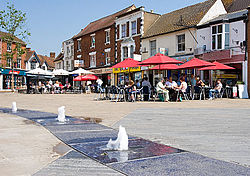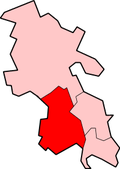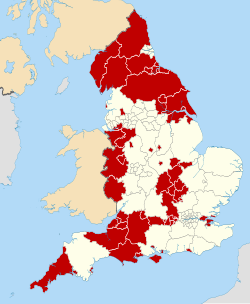Buckinghamshire | |
|---|---|
 Kingsbury Square in Aylesbury, the county town | |
 Shown within the ceremonial county of Buckinghamshire | |
| Sovereign state | United Kingdom |
| Country | England |
| Region | South East |
| Ceremonial county | Buckinghamshire |
| Unitary Authority | 1 April 2020 |
| Seat | Aylesbury |
| Government | |
| • Type | Unitary authority |
| • Local Authority | Buckinghamshire Council |
| • Leadership | Leader and cabinet [1] |
| Area | |
• Total | 604 sq mi (1,565 km2) |
| • Rank | 14th |
| Population (2024) | |
• Total | 578,772 |
| • Rank | 8th |
| • Density | 957.8/sq mi (369.8/km2) |
| • Rank | 202nd |
| Time zone | UTC+0 (Greenwich Mean Time) |
| • Summer (DST) | UTC+1 (British Summer Time) |
| ISO 3166-2 | GB-BKM |
| ONS code | E06000060 (GSS) |
| Website | Council website |
Buckinghamshire is a unitary authority area in the ceremonial county of Buckinghamshire, England. It covers about four-fifths of area of the ceremonial county and about two-thirds of its population; the City of Milton Keynes accounts for the remainder. As a unitary authority area, it is both a non-metropolitan county and a non-metropolitan district.
Contents
The district is administered by Buckinghamshire Council. The council was formed in 2020, following the abolition of the previous county council, Buckinghamshire County Council, and the four district councils covering the area.





